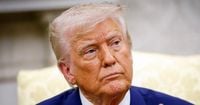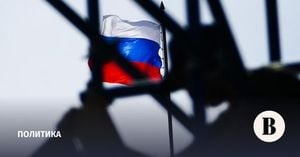President Donald Trump has expressed that negotiations between Ukraine and Russia are "coming to a head," emphasizing that neither side is "playing" him as he pushes for an end to the ongoing conflict. His remarks came on April 18, 2025, shortly after Secretary of State Marco Rubio warned that the U.S. might "move on" from its efforts to secure a peace deal if progress is not made in the coming days.
Rubio's comments, made in Paris following meetings with U.S., Ukrainian, and European officials, have intensified the pressure on both sides to reach a peace agreement. He indicated that another meeting is scheduled for next week in London, which could be crucial in determining the future of U.S. involvement in the negotiations. "We are now reaching a point where we need to decide whether this is even possible or not," Rubio told reporters, adding that if a clear path to peace does not emerge, the U.S. will step back from its role as mediator.
Trump supported Rubio's assessment, stating that if either party makes negotiations difficult, the U.S. would consider withdrawing its efforts. "Now, if for some reason, one of the two parties makes it very difficult, we’re just going to say you’re foolish. You are fools, you horrible people," Trump remarked. He reiterated the urgency of the situation, noting, "We want to see it end. We’re talking about here people dying." The president has previously claimed he could resolve the conflict quickly, although he acknowledged that such statements were made with a degree of sarcasm.
Despite these warnings, there have been signs of progress in the negotiations. The U.S. and Ukraine are nearing a long-awaited minerals deal, which Trump announced on April 17, stating, "We have a minerals deal." This agreement, signed by Ukraine’s Economy Minister Yuliia Svyrydenko and U.S. Treasury Secretary Scott Bessent, aims to facilitate significant investments and infrastructure modernization in Ukraine, while also recouping some of the military assistance the U.S. has provided since Russia's invasion in February 2022.
Meanwhile, the situation on the ground remains dire. Russia has continued its missile strikes on Ukrainian cities, with recent attacks resulting in casualties. On April 18, a strike on Kharkiv injured 98 people, including six children, according to Mayor Ihor Terekhov. This follows a deadly attack in Sumy on April 13, which killed at least 34 people during Palm Sunday celebrations. The ongoing violence underscores the urgent need for a diplomatic resolution.
In Paris, Rubio described the latest talks as constructive, emphasizing that the U.S. is prepared to use both incentives and sanctions to encourage compliance from Russia. A French diplomatic official involved in the discussions noted that the U.S. and its European allies are committed to leveraging all available tools to influence Russia's actions. However, the Kremlin's response remains cautious; spokesman Dmitry Peskov described the negotiations as "fairly complex" and reiterated Russia's openness to dialogue.
On the American front, Vice President JD Vance, who met with Italian Prime Minister Giorgia Meloni, expressed a more optimistic view, suggesting that there have been positive developments in the talks. "We think we have some interesting things to report on, of course in private," he said, though he refrained from providing specifics.
However, the Trump administration's commitment to the negotiations is under scrutiny. Analysts suggest that the administration's approach may be more about negotiating tactics than a genuine desire for peace. Thomas Wright, a former National Security Council adviser, remarked that Trump’s strategy could be seen as placing undue pressure on Ukraine for concessions, which might ultimately benefit Russia. Wright cautioned that the only way to effectively end the war is to maintain and intensify support for Ukraine on the battlefield.
The backdrop of these diplomatic efforts is a rising tide of violence in Ukraine. Recent reports indicate that Russian forces have intensified their attacks, with civilian casualties mounting. The situation remains precarious, as both sides continue to issue conflicting statements about ceasefire agreements and the terms of negotiations.
As the U.S. navigates this complex diplomatic landscape, the stakes are high. The potential for a shift in U.S. policy could significantly impact the course of the conflict. If the Trump administration decides to withdraw from negotiations, it would leave Ukraine without a crucial ally in its fight against Russian aggression. The coming days, marked by the pivotal meeting in London, will be critical in determining the future of U.S. involvement in the peace process.
In the meantime, the humanitarian crisis in Ukraine continues to escalate, with civilians caught in the crossfire of ongoing military operations. The international community watches closely, hoping for a resolution that could bring an end to the suffering.
As the world waits for developments, the urgency for a peace agreement remains paramount. With lives at stake, the pressure mounts on both Ukraine and Russia to find common ground and end the conflict that has already claimed so many lives.







